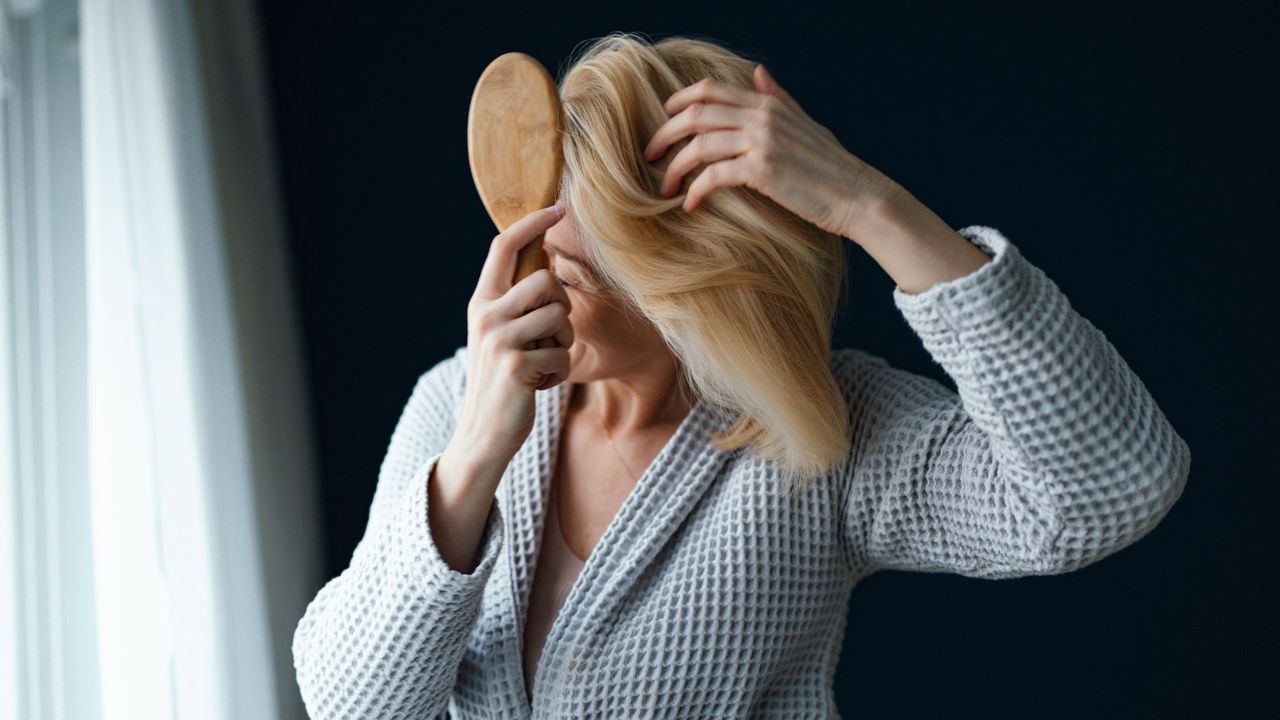What's the link between hair loss and menopause? Plus, what you can do about it
Not every woman will experience hair loss and menopause together - but these experts reveal what to do if you start experiencing symptoms and who to talk to

Menopause is something most women will go through at some point in their life but the symptoms we experience can vary. While hot flushes, weight gain and mood swings can be really unpleasant to deal with, there’s another distressing symptom we may not think about until it happens: hair loss.
It’s not precisely known how common it is to experience menopause as one of the causes of hair thinning in women, but research from the West Pomeranian University of Technology has shown that it can affect between 20 to 60% of women before they reach 60. Hair loss in women is different to men because it tends to cause thinning across the scalp and temples rather than typical bald patches. Hair restoration specialist Michael Mouzakis says, "It’s not commonly talked about as one of the menopause symptoms, but it happens to a lot of women. It can cause a lot of stress. Losing hair can decrease confidence and negative impact on a person’s mental health as well."
The fact that perimenopause and menopause symptoms can last years, or even decades for some people, means they can have a dramatic effect on your health and wellbeing. We’ve spoken to experts, including specialist doctors, to find out more about the link between hair loss and menopause, and what can be done to prevent it.
Can menopause cause hair loss?
Yes, there is a clear link between menopause and hair loss. Our aging process affects the whole body, and this includes our hair follicles. As our body starts to produce lower levels of oestrogen and progesterone during perimenopause, our hair grows slower than it used to and it can fall out faster. Mouzakis, who works with The Private Clinic, says, "These hormones are essential for hair growth and health. After menopause, oestrogen no longer counters testosterone and DHT (an androgen) can cause a change in the hair follicles on the scalp so that they become smaller in diameter, shorter in length and lighter in colour until they eventually shed."
Hair thinning and hair loss in women during menopause doesn't just apply to the hair on the head - it can also occur elsewhere on the body too. You might also notice hair in places that you haven't seen before, such as your upper lip or chin.

Michael P. Mouzakis M.D. is a plastic surgeon with a special interest in hair restoration. Mr Mouzakis is a Consultant Plastic Surgeon working at The Private Clinic’s London Harley Street and Northampton clinics. He also holds an NHS post as a Locum Consultant and Skin Cancer Specialist. He has more than 9 years of experience and has performed more than 3,000 procedures.
Is it normal to lose hair in menopause?
As the research shows, hair loss and menopause don't go hand-in-hand for everyone. Some people will go through menopause, becoming postmenopausal, without seeing any impact on their hair thickness while others will.
Dr Fionnuala Barton, a GP and British Menopause Society-accredited specialist explains that telogen (the hair follicle's resting stage) is a normal part of the hair cycle. Anyone can expect to experience hair shedding when you wash or brush your hair during this time, but menopause can contribute to a prolonged phase of telogen shedding or an imbalance of the hair growth schedule, which means your hair can come out in clumps.
Sign up for the woman&home newsletter
Sign up to our free daily email for the latest royal and entertainment news, interesting opinion, expert advice on styling and beauty trends, and no-nonsense guides to the health and wellness questions you want answered.
While hair loss and menopause may be something that many women have to deal with, Dr Barton recommends looking at other common causes of hair loss in women along with menopause. She says: “There may also be indirect effects on hair health because of the changes to immune and metabolic health that also occur as our hormones change, including an increase in susceptibility to autoimmune disease and nutritional insufficiencies.” Other causes include hereditary conditions, female pattern hair loss, stress, and medical treatment such as chemotherapy.

Dr Fionnuala Barton MBBS BSc MRCGP is a GP, Women's Health Doctor and an accredited British Menopause Society Specialist.She is passionate about optimising physical and emotional wellness for women at all stages of life and has particular interest in early recognition and management of perimenopausal and menopausal symptoms, POI, PMS and PMDD.

It's important to maintain a balanced diet rich in vitamin D, zinc, and iron if you're experiencing hair loss in menopause.
Symptoms of menopausal hair loss
Dr Dilan Fernando, a hair transplant surgeon and co-founder of The Treatment Rooms, says there are several ways to spot menopausal hair loss. It might not be obvious at first, but over time you may start to notice symptoms like dryness, a thin ponytail, and a widening hair parting.
It can be useful to take photos of the hair loss or places where hair is thinning to show a doctor if you’re seeking treatment.
Here are the most common signs of menopausal hair loss:
- Your hair parting widens
- Your hair doesn’t grow as long as it used to
- Your hair becomes drier and thinner in texture
- You scalp becomes more visible in places
- Your ponytail feels thinner
- Hair on your temples looks thinner
- Your hairline looks less dense

Dr Fernando is an expert hair surgeon and co-founder of The Treatment Rooms London. He sat on the Executive Committee of the British Association of Hair Restoration Surgery from 2020-2024. Dr Fernando is committed to providing a high level of personalised service and ensuring a positive experience for his patients. He takes pride in being a meticulous and precise hair transplant surgeon, treating every hair as precious and ensuring they survive the procedure and grow into a dense, natural-looking hair transplant result.
Will hair loss from menopause grow back?
Hair loss during menopause can be temporary or permanent depending on the person, says Dr Roshan Vara, a hair transplant surgeon who also works with The Treatment Rooms. "The rate it falls out can reduce once the hormone levels stabilise so it's important to explore how treatments can help limit the loss. We recommend consulting with a healthcare professional with a specialist interest in hair to see how they can help."
With so many changes happening to a woman’s body at this time in their life, Dr Fernando agrees that it’s important to speak to a medical professional for advice on how to stop thinning hair or hair that's falling out. "For some individuals, particularly those with underlying genetic predispositions to hair loss, the regrowth may be limited," he notes.

Dr Roshan Vara, hair transplant surgeon, is a Full Medical Member of the British Association of Hair Restoration Surgery. He co-founded The Treatment Rooms London in 2016 – an award-winning, surgeon-led clinic. Dr Vara has a background in Acute Medicine and Surgery and has worked in hospitals throughout London. He fully supports safe and quality patient care for hair transplant surgery.
How to look after your hair during menopause
- Maintain a balanced diet: Dr Vara says it’s important to make sure you’re eating a diet rich in iron, zinc and vitamin D and taking supplements, if recommended by your doctor.
- Use a medical treatment: A scalp foam containing minoxidil can help stimulate hair growth and prevent it from falling out. You don’t need a prescription for it but should discuss whether it’s the right treatment for you with your doctor.
- Reduce stress: Dr Fernando says stress or burnout from work can cause your hair to thin, so make sure are getting enough sleep and exercise, learn how to deal with stress, and speak to your doctor if you’re feeling very anxious or overwhelmed.
- Use gentle hair care: Try not to tug or overbrush your hair as this will exacerbate the hair loss. Dr Barton also recommends learning how to protect your hair from the sun, “cleansing the scalp regularly and protecting the scalp from UV radiation, avoiding excessive chemical or heat treatments or styling habit that may damage the hair shaft or follicles, avoiding haircare products containing irritant compounds such as Sodium lauryl sulphates (SLS) and using silk hair accessories to reduce friction." Consult a trichologist if you're not sure what products could be making the condition better / worse, and if in doubt, consider for one of the best shampoos for fine hair as these will be easier on the follicles.
- Consider hormone therapy: Some women find that starting HRT (hormone replacement therapy) can help reduce hair loss because it increases your oestrogen levels which will support hair follicle growth.

Kat Storr has been a digital journalist for over 15 years after starting her career at Sky News, where she covered everything from world events to royal babies and celebrity deaths. After going freelance eight years ago, she now focuses on women's health and fitness content, writing across a range of UK publications.
From perimenopause to the latest fitness trends, Kat loves researching and writing about it all. She's happy to give any fitness challenge a go and speaks to experts about wellbeing issues affecting people every day.
-
 Midsomer Murders Wild Harvest spoiler: Who was the killer and why did they commit such grisly crimes?
Midsomer Murders Wild Harvest spoiler: Who was the killer and why did they commit such grisly crimes?I’ve been a huge Midsomer Murders fan for so many years I’ve lost count and Wild Harvest is an episode that still stands out to me.
By Emma Shacklock Published
-
 Let’s celebrate what unites us – it could help bring us together
Let’s celebrate what unites us – it could help bring us togetherWe’ll be a happier society if we do, argues coach, consultant and podcast host Elizabeth Oldfield
By Elizabeth Oldfield Published
